七年级下册英语unit5知识点归纳
Unit5知识归纳人教版七年级英语下册
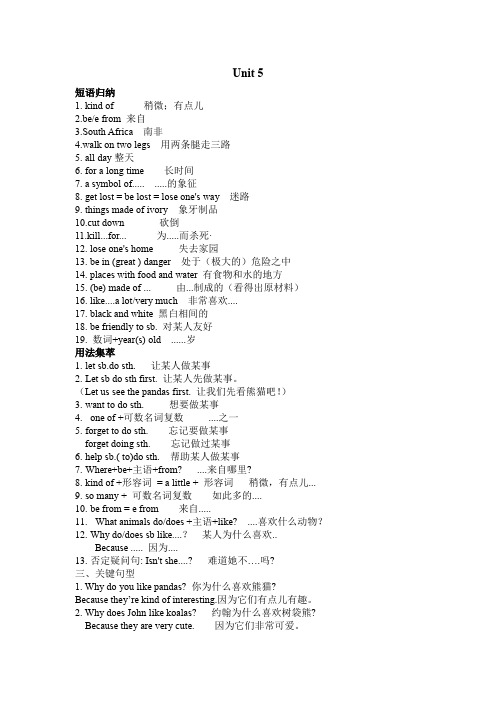
Unit 5短语归纳1. kind of 稍微;有点儿2.be/e from 来自3.South Africa 南非4.walk on two legs 用两条腿走三路5. all day整天6. for a long time 长时间7. a symbol of..... .....的象征8. get lost = be lost = lose one's way 迷路9. things made of ivory 象牙制品10.cut down 砍倒11.kill...for... 为.....而杀死·12. lose one's home 失去家园13. be in (great ) danger 处于(极大的)危险之中14. places with food and water 有食物和水的地方15. (be) made of ... 由...制成的(看得出原材料)16. like....a lot/very much 非常喜欢....17. black and white 黑白相间的18. be friendly to sb. 对某人友好19. 数词+year(s) old ......岁用法集萃1.let sb.do sth. 让某人做某事2.Let sb do sth first. 让某人先做某事。
(Let us see the pandas first. 让我们先看熊猫吧!)3.want to do sth. 想要做某事4.one of +可数名词复数....之一5.forget to do sth. 忘记要做某事forget doing sth. 忘记做过某事6.help sb.( to)do sth. 帮助某人做某事7.Where+be+主语+from? ....来自哪里?8.kind of +形容词= a little + 形容词稍微,有点儿...9.so many + 可数名词复数如此多的....10.be from = e from 来自.....11.What animals do/does +主语+like? ....喜欢什么动物?12.Why do/does sb like....?某人为什么喜欢..Because ..... 因为....13.否定疑问句: Isn't she....? 难道她不….吗?三、关键句型1. Why do you like pandas? 你为什么喜欢熊猫?Because they’re kind of interesting.因为它们有点儿有趣。
仁爱七年级下册 unit 5 必考知识点
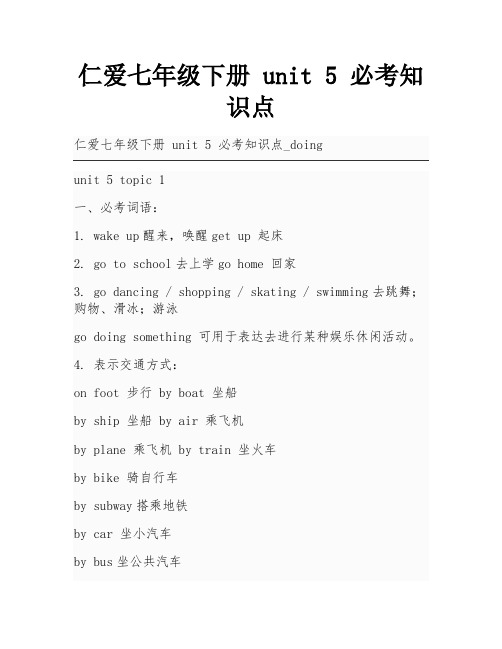
仁爱七年级下册 unit 5 必考知识点unit 5 topic 1一、必考词语:1. wake up醒来,唤醒get up 起床2. go to school去上学go home 回家3. go dancing / shopping / skating / swimming去跳舞;购物、滑冰;游泳go doing something 可用于表达去进行某种娱乐休闲活动。
4. 表示交通方式:on foot 步行 by boat 坐船by ship 坐船 by air 乘飞机by plane 乘飞机 by train 坐火车by bike 骑自行车by subway搭乘地铁by car 坐小汽车by bus坐公共汽车5. take the subway / bus / car搭乘地铁;公共汽车;小汽车6. drive a car to work = go to work by car驾车去上班take a bus to work = go to work by bus 乘公共汽车去上班go to school on foot = walk to school步行去上学7. ride a bike / horse骑自行车;骑马8. after school / class放学以后;下课以后9. play the piano / guitar/ violin弹钢琴;吉他;小提琴play basketball / soccer / football 打篮球;踢足球;打橄榄球play puter games玩电脑游戏play with a puter 玩电脑 play sports 做运动10. next to紧挨着,在…旁边11. on weekdays在工作日 at weekends在周末12. have breakfast / lunch / supper / dinner / meals 吃早餐;中餐;晚餐;正餐;一日三餐have classes / lessons / a meeting上课;上课;开会13. watch tv / movies / games / the animals看电视;电影;比赛;动物read novels / newspapers / books看小说;报纸;书14. wash one’s face / clothes洗脸;衣服15. 反义词:up – down, early – late近义词:quickly– fastget up early 早起 be late for 迟到16 表示建筑物(尤其学校建筑物):on the playground在操场 at school / home / table学校;家里;桌旁in a puter room / teachers’ office / classroombuilding / gym / library / lab / canteen在电脑室;教师办公室;教学楼;体操馆;图书馆;实验室;食堂17. around six o’clock = at about six o’clock大约在六点18. 频率副词:never, seldom, sometimes, often, usually, always重点详解1.i always e to school by bus.by+交通工具名称,表示使用某种交通方式,中间不加限定词,如果交通工具前有a, the, my 等限定词,就不能用by,而是用in或是on.on the train=by train on his bike=by bike in my car=by car.巧辩异同on foot 与 walkon foot “走路”,是介词短语,不能作谓语,只作方式状语,位于句末。
七年级英语下册Unit5单元知识点

七年级英语下册Unit5单元知识点Unit 5是七年级英语下册中的一个重要单元,这个单元中包含了大量的知识点。
以下是对Unit5单元知识点的详细介绍。
一、语法知识点1. 语态:被动语态的构成及用法被动语态的构成:be动词 + 过去分词被动语态的用法:强调动作的动作的受动方,而非主动方。
例如:The book was written by him.(这本书是他写的)2. 疑问句及其回答疑问句的构成:be动词/助动词/情态动词+主语+动词原形+其他?Yes/No + 主语 + be动词/助动词/情态动词。
例如:- Are you a student?- Yes, I am.- Do you like hamburgers?- No, I don’t.3. 特殊疑问句及其回答特殊疑问句的构成:疑问词(who/what/where/when/why/how)+ be动词/助动词/情态动词+主语+动词原形+其他?疑问词 + 主语 + be动词/助动词/情态动词。
例如:- What is your favorite color?- My favorite color is blue.- Where do you live?- I live in New York.二、词汇知识点1. 动词短语动词短语是指由动词和其它成分组成的短语,常用于描述动作、状态或动作的完成情况等。
例如:look after(照顾)、enjoy doing(喜欢做某事)、get up (起床)2. 形容词形容词是指用来修饰名词或代词的词语,可以描述名词或代词的性质、特点等。
例如:happy(快乐的)、hungry(饥饿的)、dirty(脏的)3. 名词名词是指用来表示人、事、物、地点等的词语,常用于构成句子的主语、宾语等成分。
例如:book(书)、teacher(老师)、classroom(教室)三、阅读理解阅读理解是指通过阅读一段文章,理解其中的意思并回答问题的能力。
完整版)人教版七年级英语下册第五单元知识点总结
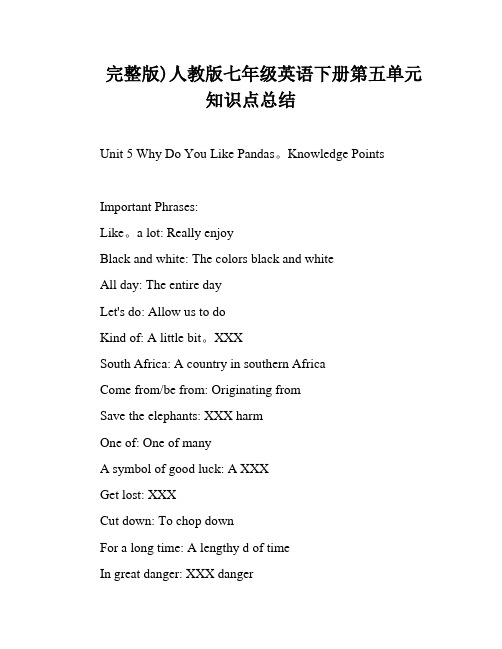
完整版)人教版七年级英语下册第五单元知识点总结Unit 5 Why Do You Like Pandas。
Knowledge PointsImportant Phrases:Like。
a lot: Really enjoyBlack and white: The colors black and whiteAll day: The entire dayLet's do: Allow us to doKind of: A little bit。
XXXSouth Africa: A country in southern AfricaCome from/be from: Originating fromSave the elephants: XXX harmOne of: One of manyA symbol of good luck: A XXXGet lost: XXXCut down: To chop downFor a long time: A lengthy d of timeIn great danger: XXX dangerXXX ivory: XXXPlaces with food and water: XXX sustenanceKill。
for: To take the life of an animal for a specific purpose1.Seeing Pandas: Observing pandas2.My Favorite Animals: XXX XXX3.e to SP: Greetings to SP4.e Back to SP: Greetings to SP upon returning5.From: Originating from6.In the Zoo: Located in a zoo7.On the Farm: Located on a farm8.My New Pet: XXX9.XXX: Bipedal movement10.Kind of: XXX11.Kind of Interesting: XXX12.A XXX: XXX13.A Little Boring: XXX14.A Kind of: A type of15.All Kinds of: Many different types of16.All Day: The entire day17.A Good Name for XXX: A fitting name for a person18.South Africa: A country in southern Africa19.South China: The southern n of China20.South America: The southern n of the Americas21.America。
(完整版)人教版七年级英语下册第五单元知识点总结

人教版七年级下册英语第五单元Unit5 Why do you like pandas? 知识要点重要短语like…a lot 非常喜欢… black and white 黑白相间 all day整天Let’s do= let us do 让我们做……kind of 有点儿,稍微 South Africa南非be from/come from 来自于save the elephants救助大象one of…其中之一a symbol of good luck好运的象征 get lost迷路 cut down 砍倒for a long time 很长时间in great danger处于(极大)危险之中things be made of ivory由象牙制成的东西 places with food and water有食物和水的地方kill……for……为……杀1.see the pandas 看熊猫2.my favorite animals我最喜欢的动物3.welcome to sp 欢迎来某地4.welcome back to sp 欢迎回到某地5.be from 来自e from来自7.in the zoo 在动物园里8.on the farm 在农场里9.my new pet 我的新宠物10.walk on two legs 用两条腿走11.kind of有点12.kind of interesting有点有趣13.a little有点14.a little boring有点无聊15.a kind of一种16.all kinds of 各种各样的17.all day整天18.a good name for sb对某人是一个好名字19.South Africa南非20.South China华南21.South America南美洲22.America, the USA美国23.the UK ,England英国24.the South Pole南极25.what animals什么动物26.save the elephants挽救大象27.one of +n复数。
(完整版)人教版七年级英语下册Unit5知识点讲解
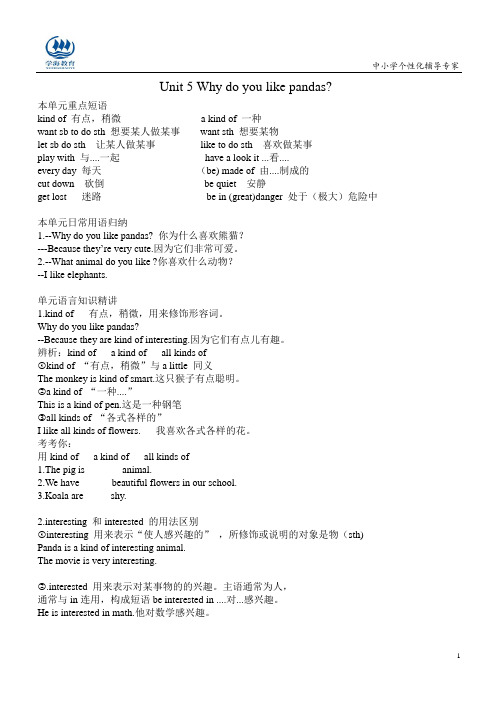
Unit 5 Why do you like pandas?本单元重点短语kind of 有点,稍微 a kind of 一种want sb to do sth 想要某人做某事want sth 想要某物let sb do sth 让某人做某事like to do sth 喜欢做某事play with 与....一起have a look it ...看....every day 每天(be) made of 由....制成的cut down 砍倒be quiet 安静get lost 迷路be in (great)danger 处于(极大)危险中本单元日常用语归纳1.--Why do you like pandas? 你为什么喜欢熊猫?---Because they’re very cute.因为它们非常可爱。
2.--What animal do you like ?你喜欢什么动物?--I like elephants.单元语言知识精讲1.kind of 有点,稍微,用来修饰形容词。
Why do you like pandas?--Because they are kind of interesting.因为它们有点儿有趣。
辨析:kind of a kind of all kinds of①kind of “有点,稍微”与a little 同义The monkey is kind of smart.这只猴子有点聪明。
②a kind of “一种....”This is a kind of pen.这是一种钢笔③all kinds of “各式各样的”I like all kinds of flowers. 我喜欢各式各样的花。
考考你:用kind of a kind of all kinds of1.The pig is _______animal.2.We have ______beautiful flowers in our school.3.Koala are _____shy.2.interesting 和interested 的用法区别①interesting 用来表示“使人感兴趣的”,所修饰或说明的对象是物(sth) Panda is a kind of interesting animal.The movie is very interesting.②.interested 用来表示对某事物的的兴趣。
七年级英语下册人教版unit5知识点归纳
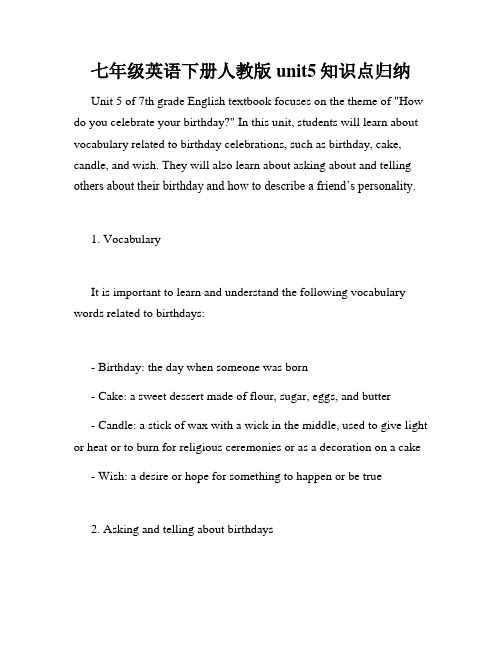
七年级英语下册人教版unit5知识点归纳Unit 5 of 7th grade English textbook focuses on the theme of "How do you celebrate your birthday?" In this unit, students will learn about vocabulary related to birthday celebrations, such as birthday, cake, candle, and wish. They will also learn about asking about and telling others about their birthday and how to describe a friend’s personality.1. VocabularyIt is important to learn and understand the following vocabulary words related to birthdays:- Birthday: the day when someone was born- Cake: a sweet dessert made of flour, sugar, eggs, and butter- Candle: a stick of wax with a wick in the middle, used to give light or heat or to burn for religious ceremonies or as a decoration on a cake- Wish: a desire or hope for something to happen or be true2. Asking and telling about birthdaysAsking and telling about birthdays is an important skill to learn to communicate with others about a significant event in their life. Here are some sentence patterns to help:- What's your birthday? My birthday is on ____________.- When is your birthday? My birthday is in _____________.- How old are you? I am ______________ years old.3. Describing a friend’s personalityIt can be fun and interesting to describe a friend’s personality. H ere are some adjectives that can be used to describe a person's personality:- Funny: someone who is able to make you laugh- Friendly: someone who is sociable and easy to talk to- Outgoing: someone who enjoys meeting new people and doing new things- Serious: someone who is focused and determined- Shy: someone who is nervous or uncomfortable in social situations- Sporty: someone who enjoys playing sports and being physically active- Talkative: someone who likes to talk a lot4. GrammarUnit 5 covers several grammatical structures that are important for 7th grade English learners:- Wh- questions: asking questions that include "who", "what", "when", "where", "why", and "how"- Personal pronouns: using pronouns to refer to people or objects in conversation, such as "I", "you", "he", "she", and "it"- Possessive adjectives: using adjectives to show ownership or possession, such as "my", "your", "his", "her", and "their"- Demonstrative pronouns: using pronouns to indicate specific objects or people, such as "this", "that", "these", and "those"5. Listening and speakingUnit 5 provides students with many opportunities to practice listening and speaking skills. Students can work in pairs or small groups to practice asking and answering questions about birthdays, describing their friends' personalities, and giving opinions on different birthday celebrations.In conclusion, Unit 5 of the 7th grade English textbook is an important unit that teaches students about vocabulary related to birthday celebrations, asking and telling about birthdays, describing a friend's personality, and key grammatical structures. By practicing these skills, students will be able to communicate better in English and have fun celebrating their birthdays with their friends.。
七年级英语下册Unit5知识点汇总

七年级英语下册Unit5知识点汇总Unit5ourSchoolLifeTopic1一、重点词语:aeup醒来,唤醒getup起床gotoschool去上学gohoe回家godancing/shopping/sating/siing去跳舞;购物、滑冰;游泳godoingsoething可用于表达去进行某种娱乐休闲活动。
表示交通方式:onfoot步行byboat坐船byship坐船byair乘飞机byplane乘飞机bytrain坐火车bysubay搭乘地铁bycar坐小汽车bybus坐公共汽车bybie骑自行车taethesubay/bus/car搭乘地铁;公共汽车;小汽车driveacartoor=gotoorbycar驾车去上班taeabustoor=gotoorbybus乘公共汽车去上班gotoschoolonfoot=altoschool步行去上学rideabie/horse骑自行车;骑马afterschool/class放学以后;下课以后playthepiano/guitar/violin弹钢琴;吉他;小提琴playbasetball/soccer/football打篮球;踢足球;打橄榄球playputergaes玩电脑游戏playithaputer玩电脑playsports做运动0.nextto紧挨着,在…旁边1.aplanofyschool一幅我们学校的平面图oneedays在工作日ateeends在周末3.havebreafast/lunch/supper/dinner/eals吃早餐;中餐;晚餐;正餐;一日三餐haveclasses/lessons/aeeting上课;上课;开会atchTV/ovies/gaes/theanials看电视;电影;比赛;动物readnovels/nespapers/boos看小说;报纸;书ashone’sface/clothes洗脸;衣服反义词:up–don,early–late近义词:quicly–fast getupearly早起belatefor迟到thefirst/second/third/fourthday;二;三;四天cleanthehouse打扫房子表示建筑物:ontheplayground在操场atschool/hoe/table在学校;家里;桌旁inaputerroo/teachers’office/classroobuilding/gy/library/lab/canteen 在电脑室;教师办公室;教学楼;体操馆;图书馆;实验室;食堂0.aroundsixo’cloc=ataboutsixo’cloc大约在六点1.频率副词:never,seldo,soeties,often,usually,alays二、重点句型:It’stietogetup.该起床的时候了。
仁爱版七年级英语下册unit5知识点
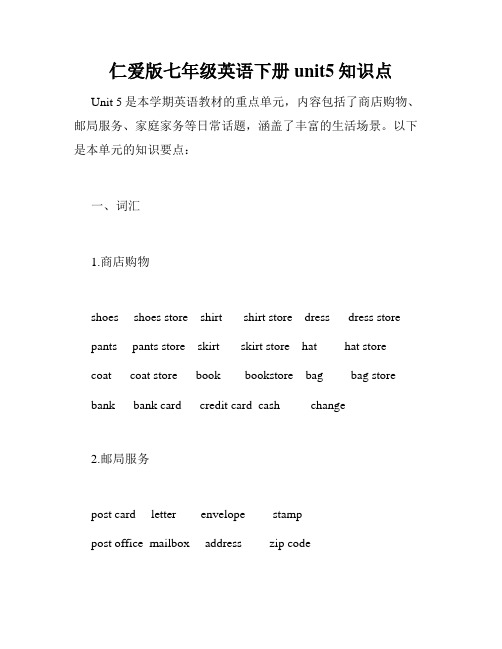
仁爱版七年级英语下册unit5知识点Unit 5是本学期英语教材的重点单元,内容包括了商店购物、邮局服务、家庭家务等日常话题,涵盖了丰富的生活场景。
以下是本单元的知识要点:一、词汇1.商店购物shoes shoes store shirt shirt store dress dress storepants pants store skirt skirt store hat hat storecoat coat store book bookstore bag bag storebank bank card credit card cash change2.邮局服务post card letter envelope stamppost office mailbox address zip code3.家庭家务clean clean up sweep mopwash laundry fold drydish do the dishes set the table clear the table二、重点语法本单元的语法重点是一般现在时和there be句型的运用。
1.一般现在时一般现在时通常用来表示反复发生的动作、习惯性的行为或者现在的状态。
它的构成方式是主语+动词原形+其他。
注意第三人称单数形式应该在动词后面加上“s”。
例如:I often go shopping on weekends. (我经常在周末去购物。
)She always buys books in the bookstore. (她总是在书店买书。
)2.there be句型there be句型用来表示某地或某处有某物。
当表示单数或者不可数名词时,应该用there is;当表示复数名词时,应该用there are。
例如:There is a bank in front of the bookstore. (书店前面有一家银行。
)There are some chairs in the classroom. (教室里有一些椅子。
七年级下册英语unit5知识点总结

七年级下册英语unit5知识点总结本文为七年级下册英语unit5知识点总结,旨在帮助学生们全面掌握该单元中的重点知识。
一、重点词汇1. road 路,道路2. bridge 桥梁3. turn 转弯,旋转4. corner 拐角,角落5. opposite 对面的6. near 靠近的7. far 远的8. map 地图9. straight 直行的,直接的10. left 左边的11. right 右边的12. go straight 直走,往前走13. cross 穿过,横过二、重点句型1. Excuse me, where is the nearest restaurant? 对不起,请问最近的餐厅在哪里?2. Go straight and turn left at the second corner. 直走,在第二个拐角处向左转。
3. The supermarket is opposite the library. 超市在图书馆对面。
4. How do I get to the park from here? 从这里怎么去公园?5. The post office is far from here. 邮局离这里很远。
三、重要知识点1. 方向词的运用在掌握方向词的基础上,还要能够熟练地将它们运用到具体的语境中,如逛街时问路、规划旅行路线等。
2. 常见地点的表达必须掌握各种场所的名称和位置,包括公园、银行、商场、餐厅等,同时也要能够准确表述它们与自己当前位置之间的方向关系。
3. 地图的使用地图不仅是认识世界、了解地理环境的重要工具,也是生活中户外活动的必备工具。
学生们需要熟悉地图上的常见符号与标识,能够运用地图找到目的地。
四、学习方法1. 注重听力和口语在学习过程中,应该多听多说,模仿语音、语调和语速,提高自己的英语听力和口语水平。
2. 多做练习要想提高自己的运用能力,必须多加练习,可以通过老师布置的练习题、课后作业以及自主练习等方式不断提高。
七年级英语下册《Unit 5 Amazing things》知识梳理

《Unit 5 Amazing things》Comic strip & Welcome to the unit:1.---I saw a UFO yesterday. ---Really?2.The world is full of amazing things.=The world is filled with amazing things.amazing things 惊奇的事3.Do you know any fun facts about the world?fun facts 有趣的事4.Fish sleep with their eyes open. 睁着眼睛睡觉5.Our eyes are the same size from birth, but our nose and ears never stop growing.the same size/age/ colour as…和…一样的尺寸、年龄、颜色stop doing sth./ stop to do sth./ stop sb. (from) doing sth.阻止某人做某事6.The Sun is about 1,300,000 times larger than the Earth.A is +倍数+比较级+than + B. A is +倍数+as +原级+as +B.7.There are no bones in the back of elephants’ feet---only fat.There are not any bones in th e back of …. no= not any/a/anHe has no good friends.=He doesn’t have any good friends.Reading1.Somet hing strange happened there./What happened there? What happened to him?2.As usual, they sat down under a big tree.as usual 像平常一样3.They turned around but saw nothin g.=They turned around but didn’t see anythi ng. nothing =not an ything4.“Here i t is,” Andy said to himself.say to oneself 自言自语5.When it miaowed, it sounded like a whisper.sound like 听起来像ter that day, they took the little cat to the animal centre.take sb to…带某人去…7.Suddenly, they heard a whisper from the bushes behind the tree.hear a whisper from the bushes 从灌木丛里听到低低的说话声8.Andy picked up the little cat an d went to find Millie and Amy.pick up 捡起9.She told Andy everything.=She told everything to Andy.tell sb sth=tell sth to sbGrammar1.When we got to the museum, there were a lot of people there.get to 到达2.Some of them bought cards of the animals there.buy sb. sth.=buy sth.for sb.3.We came back to school at 1 p.m.come back to 返回4.一般过去时的用法:a. 表示过去的动作或状态,常和明确的过去时间状语连用,如:yesterday, last week, three days ago, in 1998等,或与由when引导的从句。
七年级英语下册Unit5Amazingthings知识点归纳
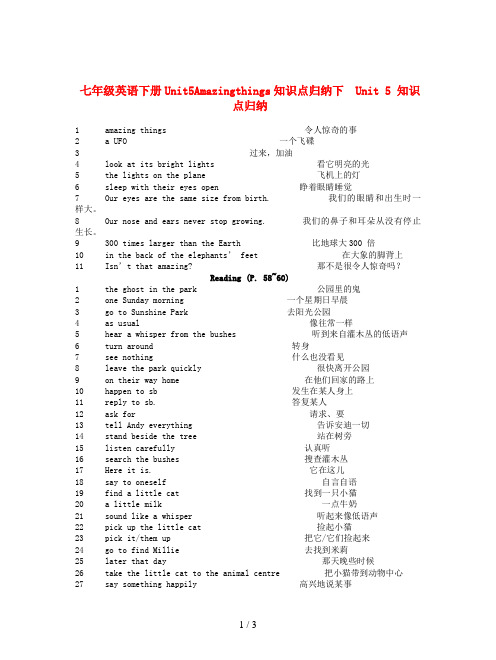
七年级英语下册Unit5Amazingthings知识点归纳下 Unit 5 知识点归纳1 amazing things 令人惊奇的事2 a UFO 一个飞碟3 过来,加油4 look at its bright lights 看它明亮的光5 the lights on the plane 飞机上的灯6 sleep with their eyes open 睁着眼睛睡觉7 Our eyes are the same size from birth. 我们的眼睛和出生时一样大。
8 Our nose and ears never stop growing. 我们的鼻子和耳朵从没有停止生长。
9 300 times larger than the Earth 比地球大300 倍10 in the back of the elephants’ feet 在大象的脚背上11 Isn’t that amazing? 那不是很令人惊奇吗?Reading (P. 58~60)1 the ghost in the park 公园里的鬼2 one Sunday morning 一个星期日早晨3 go to Sunshine Park 去阳光公园4 as usual 像往常一样5 hear a whisper from the bushes 听到来自灌木丛的低语声6 turn around 转身7 see nothing 什么也没看见8 leave the park quickly 很快离开公园9 on their way home 在他们回家的路上10 happen to sb 发生在某人身上11 reply to sb. 答复某人12 ask for 请求、要13 tell Andy everything 告诉安迪一切14 stand beside the tree 站在树旁15 listen carefully 认真听16 search the bushes 搜查灌木丛17 Here it is. 它在这儿18 say to oneself 自言自语19 find a little cat 找到一只小猫20 a little milk 一点牛奶21 sound like a whisper 听起来像低语声22 pick up the little cat 捡起小猫23 pick it/them up 把它/它们捡起来24 go to find Millie 去找到米莉25 later that day 那天晚些时候26 take the little cat to the animal centre 把小猫带到动物中心27 say something happily 高兴地说某事28 find out 查明、弄清楚29 go away 走开30 shout at somebody 向某人大叫31 look carefully for sth 仔细寻找某物32 run away 逃跑33 tell Andy about the strange sound 告诉安迪关于奇怪的声音34 go back to the park 回到公园35 give the little cat to Amy 把这个小猫给了艾米Grammar (P. 61~62)1 the Fun World Museum 趣味世界博物馆2 take a lot of photos 拍许多照片3 some of us 我们中一些人4 stop doing st h 停止做某事5 buy cards of the animals 买动物卡片6 回到学校7 A small monkey is only 11 centimetres tall. 一只小猴子只有11厘米高。
人教七年级下册英语U5知识点
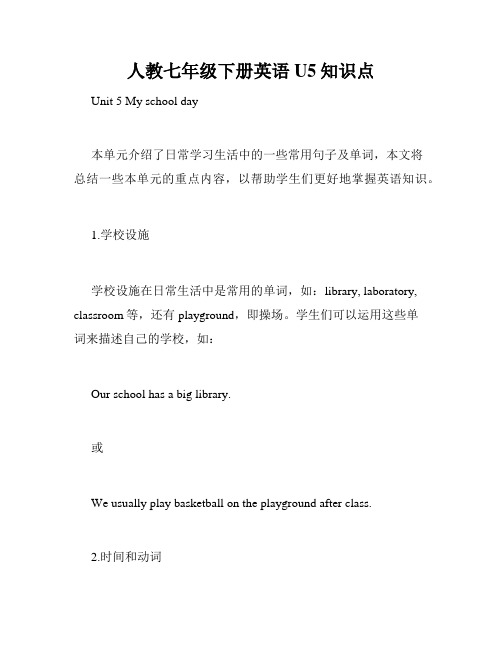
人教七年级下册英语U5知识点Unit 5 My school day本单元介绍了日常学习生活中的一些常用句子及单词,本文将总结一些本单元的重点内容,以帮助学生们更好地掌握英语知识。
1.学校设施学校设施在日常生活中是常用的单词,如:library, laboratory, classroom等,还有playground,即操场。
学生们可以运用这些单词来描述自己的学校,如:Our school has a big library.或We usually play basketball on the playground after class.2.时间和动词时间和动词是英语语言中的重要部分。
在本单元中,有一些常用动词,如:get up, have breakfast/lunch/dinner, go to bed等。
学生们可以运用这些单词来描述自己的日常生活,如下:I usually get up at 6:30 in the morning.I have breakfast at 7 o'clock.I go to bed at 10 o'clock at night.3.日常活动在学习英语的过程中,日常活动也是常用语句。
在本单元中,有一些常用语句,如:It's time to..., I take..., I play..., I do..., 等。
学生们可以运用这些常用语句来叙述自己的日常生活,如下:It's time to go to school now.I take a bus to school every morning.I usually play basketball with my friends after school.I do my homework before dinner.4.一般现在时的动词变化一般现在时在英语语言中也是十分常见的。
人教版七年级下册英语Unit 5 --6知识点语法归纳总结
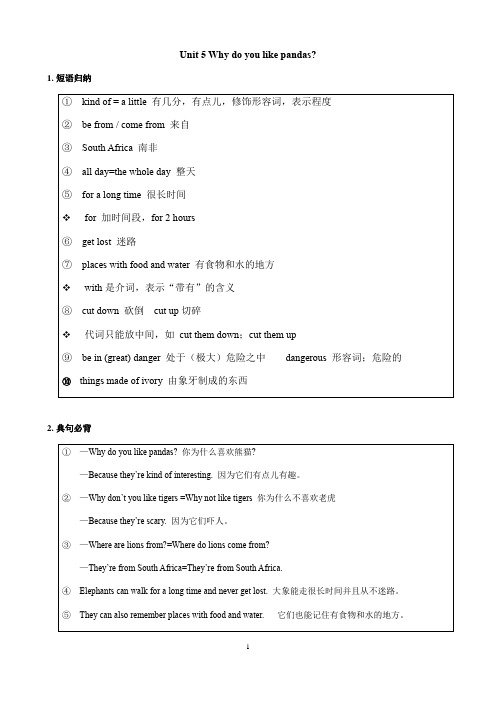
Unit 5 Why do you like pandas?1.短语归纳2.典句必背3.用法集萃(1)Well, because she’s kind of boring. 嗯,因为她有点儿无聊❖kind of意为“稍微;有点儿”,用来修饰形容词或副词,表示程度,和a bit, a little, a little bit意义相同。
例:The monkey is kind of cute. 那只猴子有点儿可爱❖含有kind的短语还有:牛刀小试There are many ______ animals in the zoo. Most of them are _______ cute.A.kind of; kind ofB.kinds of; kind ofC.kinds of; kinds ofD.kind of; kinds of(2)She sleeps all day, and her name is Lazy. 她整天睡觉,她的名字叫Lazy❖sleep可以作动词,也可以作名词,意为“睡觉”。
例:It’s time to sleep. 该睡觉了I sometimes have a sleep in the afternoon. 我有时下午睡觉❖派生词:sleepy adj.困乏的;想睡的asleep adj. 睡着的(fall asleep 入睡;睡着)牛刀小试Paul stayed up late to watch the soccer game last night and now he feels very_______ .A.sleep B . asleep C.sleepy(3)I don’t like cats because they’re lazy. 我不喜欢猫,因为它们很懒❖lazy作形容词,意为“懒散的;懒惰的”。
例:The boy is lazy and he never gets up early on weekends.❖反义词:hard-working adj. 勤奋的;勤勉的(4)People say that “an elephant never forgets”. 人们常说“大象从不忘记”❖辨析:forget to do sth.;forget doing sth.牛刀小试Don’t forget _____ your hands before you have dinner.A.to washB. washingC. washD. washes(5)Elephants can walk for a long time and never get lost. 大象能够长时间行走,而且从不迷路❖lost 作为形容词,意为“走失的,迷路的,失散的”或者“丢失的,遗失的”;常与系动词be或者get连用,表示“丢失,走失,迷路”。
七年级英语(下册) Unit 5重点词汇和重点短语

七年级英语(下册)Unit5重点词汇和重点短语一、词汇攻关1.building(n.)→build(v.&n.)建筑;体格→built(过去式/过去分词)建造,建设→builder(n.)建立者;建筑者★build sb.sth./build sth.for sb.为某人建造某物★build up建立;增进;增强★of strong build体格健壮的2.train(n.&v.)→trained(adj.)受过训练的;熟练的→trainee(n.)受训练者;实习生→trainer(n.)运动鞋;教练员;驯兽师→training(n.)训练;锻炼;培养;驯化★train sth./sb.to do sth.训练……做……★train for为……接受训练★train as作为……接受训练3.catch(v.)→caught(过去式/过去分词)赶上★catch a cold感冒★catch up with追上,赶上★catch fire着火★catch the train/plane赶上火车/飞机★be caught in the rain淋雨4.ride(v.&n.)→rode(过去式)→ridden(过去分词)骑★give sb.a ride捎某人一程5.watch(v.)→watches(第三人称单数)→watched(过去式/过去分词)观看;当心→watch(n.)表,手表★watch out当心★keep watch(for sth.)看守,警惕★on watch值班★watch TV看电视6.begin(v.)→began(过去式)→begun(过去分词)→beginning(现在分词&n.)开始;开端→beginner(n.)初学者;生手;创始者★begin doing/to do sth.开始做某事★begin with以……作为开始★in the beginning最初,起初★from beginning to end从头到尾7.swim(v.)→swam(过去式)→swum(过去分词)→swimming(现在分词)游泳→swimmer(n.)游泳者★go swimming去游泳★go for a swim去游泳8.listen(v.)→listening(现在分词)听→listener(n.)听者;听众★listen to听;倾听★listen for留神听9.music(n.)→musical(adj.)音乐的→musician(n.)乐手,音乐家,乐师10.talk(n.&v.)→talker(n.)说话者→talkative(adj.)爱说话的,健谈的★talk to/with sb.与某人交谈,谈话★talk about/on…谈论……★talk back(to sb.)顶嘴,回嘴★talk to oneself自言自语★give a talk演讲,讲话11.make(v.)→made(过去式/过去分词)做,制造;使成为→maker(n.)生产者,制造者→making(n.)制作;制造★make sb.sth./make sth.for sb.为某人制作某物★make up编造;和解;化妆;弥补★make it设法安排;成功12.boring(adj.)→bore(v.)使厌烦→bored(adj.)无聊的,无趣的★be bored with sth.对……感到厌烦13.clean(v.&adj.)→cleaning(现在分词)→cleaned(过去式/过去分词)打扫→cleaner(n.)清洁工;吸尘器★do some cleaning打扫卫生★clean up清除;打扫干净14.run(v.)→ran(过去式)→run(过去分词)→running(现在分词)跑→runner(n.)跑步者★run after追赶;追求★run about到处跑15.use(v.&n.)→used(过去式/过去分词)用,使用→user(n.)使用者→useful(adj.)有用的→useless(adj.)无用的★used to do sth.过去常常做某事★be used to doing sth.习惯于做某事★be used to do sth.被用来做某事★come into use开始使用★be in use使用中★use your head动动脑子★make use of利用;使用16.shelf(n.)→shelves(pl.)搁板,搁架→bookshelf(n.)书架17.keep(v.)→kept(过去式/过去分词)保存;保持→keeper(n.)看守人;守卫;守门员★keep away from远离;避开★keep doing sth.持续做某事★keep sb.from doing sth.阻止某人做某事★keep up with跟上18.sit(v.)→sat(过去式/过去分词)→sitting(现在分词)坐★sit down就座,坐下★sit up坐起来;使坐起来19.write(v.)→wrote(过去式)→written(过去分词)写→writer(n.)作家,作者★reading and writing阅读与写作★write(a letter)to sb.给某人写信★write back to sb.给某人回信★write down写下,记下20.wonderful(adj.)→wonder(v.)想知道;感到惊讶→wonder(n.)惊讶;奇迹→wonderfully(adv.)不可思议地;绝妙地★no wonder不足为奇21.history(n.)→historical(adj.)历史的;历史学的;与历史有关的→historic(adj.)有历史意义的;历史上著名的;历史性的22.few(adj.&pron.)→fewer(比较级)较少的→fewest(最高级)最少的★a few几个,一些23.science(n.)→scientist(n.)科学家→scientific(adj.)科学的,有关科学的★science fiction科幻小说24.easy(adj.)→easily(adv.)容易地→easier(比较级)较容易的→easiest(最高级)最容易的→hard/difficult(反义词)困难的★take it easy别紧张25.interesting(adj.)→interested(adj.)感兴趣的→interest(n.&v.)兴趣,爱好;利益,利息;权益;使感兴趣★be/get/feel interested in对……感兴趣★show/have(an)interest in…对……有兴趣★lose interest in…对……失去兴趣★with interest饶有兴趣地26.difficult(adj.)→difficulty(n.)困难★have difficulty(in)doing sth.做某事有困难★without difficulty毫不费力地;轻而易举地27.learn(v.)→learnt/learned(过去式/过去分词)学习,学会;获悉→learner(n.)学习者,初学者★learn to do sth.学会做某事★learn from…从/向……学习★learn sth.by oneself自学★learn…by heart用心学……;背下来28.activity(n.)→activities(pl.)活动★outdoor activities户外运动29.study(v.&n.)→studies(第三人称单数)→studied(过去式/过去分词)学习;研究→study(n.)书房30.early(adj.)→early(adv.)早;提早→earlier(比较级)较早的→earliest(最高级)最早的→late(反义词)迟到的;晚的★catch the early bus赶上早班车★early in the morning清早31.late(adj.)→late(adv.)迟到→lately(adv.)近来★be late for doing sth.做某事迟到了★in the late afternoon傍晚★later in the afternoon下午的晚些时候二、重点短语1.come on快点儿;加油;来吧2.go to school on foot/walk to school步行去上学3.at school在学校,在上课4.the Great Wall长城5.make room for为……腾出个地儿6.dining hall餐厅7.at the school gate在学校门口8.by bus/car/subway乘公共汽车/小汽车/地铁9.on weekdays在工作日10.take the bus/train/plane/car乘坐公交车/火车/飞机/小汽车11.listen to music听音乐12.do one's homework做家庭作业13.go to bed上床睡觉14.the same to you你也一样15.three times a week一周三次16.do some cleaning打扫卫生17.ride a bike骑自行车18.once/twice a week每周一次/两次19.know about了解,知道20.on Thursday morning在周四上午21.be over结束22.in one's free time在某人的业余时间23.play cards打扑克牌24.classroom building教学楼25.on time按时;准时26.borrow…from…从……借来……27.show sb.around带某人参观28.have a soccer game有一场足球赛29.in the swimming pool在游泳池30.write(a letter)to sb.给某人写信31.at the back of…在……的后面32.have an English class上英语课33.learn about the past了解过去34.a map of China一幅中国地图35.work on math problems算数学题36.be kind to sb.对某人友好37.some other subjects一些别的科目38.different kinds of…不同种类的……39.watch a movie/see a film看电影40.study English grammar学习英语语法41.care about关心;在乎42.play computer games玩电脑游戏三、重点句型1.It's time for e on!上课时间到了,快点!2.I seldom walk to school.我很少步行上学。
人教七年级下unit5知识点

人教七年级下unit5知识点在人教七年级下unit5课程中,我们学习了关于“食物和饮料”这一主题的知识点。
以下是本单元主要的知识点:一、单词和短语1. 食物:fruit, vegetables, chicken, fish, bread, rice, noodles, milk, cheese, cake 等。
2. 饮料:water, juice, tea, coffee, cola, lemonade 等。
3. 特殊饮食需求:vegetarian(素食主义者), vegan(纯素食主义者)等。
4. 食物和饮料的数量:a glass of milk, a cup of tea, a bottle of water, a loaf of bread 等。
二、语法1. 倒装句:在英语中,为了强调某些语句内容,常使用倒装句。
例如:Never have I seen such a beautiful sunset.(我从未看过如此美丽的日落。
)2. 疑问句类型:在英语中,疑问句有两种类型,一种是一般疑问句,以助动词开头,另一种是特殊疑问句,以特殊疑问词开头。
例如:Do you like apples?(你喜欢苹果吗?)What kind of food do you like?(你喜欢什么食物?)三、口语表达1. 询问对方喜欢什么食物、饮料等:What kind of food/drink do you like?2. 询问对方是否饱了:Are you full?3. 表达自己的饮食要求:I am a vegetarian.4. 发表自己对食品的看法:I love pizza. It's delicious.以上就是本单元的主要知识点,希望同学们能够通过学习,掌握这些基础的英语单词和语法知识,为今后更高层次的英语学习打下坚实的基础。
- 1、下载文档前请自行甄别文档内容的完整性,平台不提供额外的编辑、内容补充、找答案等附加服务。
- 2、"仅部分预览"的文档,不可在线预览部分如存在完整性等问题,可反馈申请退款(可完整预览的文档不适用该条件!)。
- 3、如文档侵犯您的权益,请联系客服反馈,我们会尽快为您处理(人工客服工作时间:9:00-18:30)。
七年级下册英语unit5知识点归纳七年级下册英语Unit 5知识点归纳
Unit 5是七年级下册英语教材中的一个重要单元,主要学习关于“明星和娱乐”的英语知识。
本文将对Unit 5的知识点进行详细归纳,以便同学们更好地掌握这个单元的内容。
1. New words and phrases
本单元的重点词汇和短语:
1. famous adj. 著名的,出名的
2. album n. 专辑
3. award n. 奖项,奖金
4. become v. 成为,变成
5. drama n. 戏剧
6. fan n. 粉丝,追星族
7. hit n. 热门歌曲,大片
8. magazine n. 杂志
9. movie n. 电影
10. performance n. 演出,表演
11. popular adj. 受欢迎的,流行的
12. singer n. 歌手
13. talent n. 天赋,天才
14. TV show n. 电视节目
2. Grammar
本单元的语法重点:
1. Be动词的用法:am/is/are
例如:
I am a fan of Justin Bieber.
He is a famous singer.
We are going to watch a movie tonight.
2. 一般现在时的第三人称单数形式:
一般情况下,一般现在时的动词加s,但是词尾是s、x、sh、ch结尾的动词要加-es。
例如:
She loves to watch TV shows.
My brother listens to pop music.
Tom watches a lot of drama on TV.
3. 物主代词的用法:
我的 + 名词:my 名词
你的 + 名词:your 名词他的 + 名词:his 名词
她的 + 名词:her 名词
我们的 + 名词:our 名词你们的 + 名词:your 名词他们的 + 名词:their 名词例如:
This is my album.
That is her TV show.
Their performance was amazing.
3. Sentence patterns
本单元的句型重点:
1. I am a fan of...
例如:
I am a fan of Justin Bieber.
I am a fan of superhero movies.
2. He/She is a famous...
例如:
She is a famous singer.
He is a famous actor.
3. He/She became famous because...
例如:
He became famous because he won an award.
She became famous because she starred in a hit movie.
4. Do you like...?
例如:
Do you like pop songs?
Do you like to watch TV shows?
4. Listening and speaking
本单元的听说重点:
1. 用英语发表关于自己最喜欢的歌手、电影或电视节目的简短演讲。
例如:
My favorite singer is Taylor Swift. I love her songs and her voice. She is also very beautiful and stylish. I have all of her albums and I listen to her music every day.
2. 听取他人对于自己最喜欢的歌手、电影或电视节目的评论,并发表自己的看法。
例如:
A: Do you like the movie Titanic?
B: Yes, I do. It's a classic love story with great acting and beautiful music. Why do you ask?
A: I didn't really like it because I thought it was too long and tragic.
B: I see. Well, everyone has their own opinion.
5. Reading and writing
本单元的阅读写作重点:
1. 阅读有关明星和娱乐界的文章,并回答相关问题。
例如:
Read the following passage and answer the questions below:
Justin Bieber is a famous singer from Canada. He became famous because of his YouTube videos, and now he has millions of fans all over the world. He has won many awards for his music, and he has released several hit albums. In addition to his music career, he has also made some appearances in movies and TV shows.
Questions:
1. Where is Justin Bieber from?
2. How did Justin Bieber become famous?
3. Has Justin Bieber won any awards for his music?
4. What else has Justin Bieber done besides music?
2. 根据自己选择的明星、歌曲、电影或电视节目,写一篇简短的介绍或评论。
例如:
My favorite singer is Adele. She has an amazing voice and her songs are so emotional and powerful. I especially love her song "Someone Like You". It always makes me feel so many emotions and I love singing along to it. I have seen her live in concert twice and it was an incredible experience. Adele is definitely one of the greatest singers of our time.。
